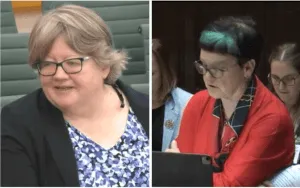A disabled MP has warned the government that the Department for Work and Pensions (DWP) is “broken” and “not fit for purpose”, and that major changes to the social security system need to be co-designed with disabled people and benefit claimants.
Steve Darling, the Liberal Democrat spokesperson on work and pensions, told MPs on Tuesday that the government needs to “lift the bonnet and redesign the system”.
He also pointed to research that showed universal credit was driving people “even deeper into poverty” because the level of payments was too low.
He was taking part in the debate on the annual order to uprate social security payments, which in April will see the state pension rise by 4.1 per cent, and most other benefits, including personal independence payment, by 1.7 per cent, increasing spending by £6.9 billion in 2025-26.
Debbie Abrahams, the Labour MP who chairs the Commons work and pensions committee, of which Darling is a member, had earlier told MPs that the “currently inadequate social security system” was driving disabled people and others into poverty because of a “steady and consistent erosion in the value of social security support”.
She said this had affected the value of universal credit, jobseeker’s allowance, employment and support allowance (ESA), income support, housing benefit, child tax credit, working tax credit and child benefit.
She said she wanted to focus her words on disability benefits because of recent “media speculation” about the government’s plans, which is likely to include last week’s article in The Times which reported that all those on out-of-work disability benefits could be forced to carry out work-related activity, while hundreds of thousands of them could see their support cut.
Abrahams said people were already “barely clinging on”, and she pointed to a report on UK benefit levels by her committee last year – when it was chaired by Labour’s new social security and disability minister, Sir Stephen Timms – that suggested benefit levels were “too low and that claimants are often unable to afford daily living costs and extra costs associated with having a health condition or disability”.
She pointed to academic research from 2015 which found that a programme to reassess people on incapacity benefit through the work capability assessment was linked to 590 suicides in just three years.
And she highlighted the “horrific” deaths of social security claimants whose benefits had been stopped, including Errol Graham, who starved to death after his ESA was halted when he missed a face-to-face assessment.
She had begun her speech by responding to “quite dangerous” comments made by Conservative shadow work and pensions minister Danny Kruger.
Kruger had told MPs that “too many people are being consigned to a life of inactivity and dependency, especially via the categories of sickness benefit”, which he said “reflect the fact that we have bad rates of physical ill health, including obesity and, as is strongly evidenced in the statistics, bad backs because we simply do not move around enough in the day”.
He claimed the rise in “welfare claims cannot be attributed to worsening health or longer NHS waiting lists; the problem is growing far faster than that”.
He said: “People are not being incentivised to take jobs because the offer from the welfare system is better.”
He claimed that for many people “the incentives made them go the other way, further away from work into the sickness category, because that is where the good money is” and was “sometimes £3,000 more than the minimum wage” and was “big and unconditional money”.
Kruger said he was “encouraged” by “exciting hints in the media” that the government could “scrap the limited capacity for work category altogether, scrap the work capability assessment, merge employment and support allowance into the personal independence payment system, or require people on sickness benefits to engage with work coaches”.
And he called for “tougher conditions” to be imposed on disabled claimants and “a clear message to go out from the government that unless a person is so severely disabled or ill that they genuinely can never work at all, they will not have a life on benefits”.
Abrahams accused him of using “policy-based evidence” in his call for stricter conditionality.
She said research had shown there was “no evidence to support tough sanctions” and warned him that claimants had “lost their lives because of sanctions”, and that sanctioning benefits had “real-life consequences”.
Darling also disagreed with Kruger and told him that “an awful lot of people are off sick with hip problems or mental health challenges, and the challenge people have in getting back into work is the broken health system that was left by the previous Conservative government”.
Sir Stephen said the government would lay out its plans for reform of health and disability benefits this spring.
Meanwhile, more than 200 benefits claimants have been awarded between £200 and £3,000 in damages for losing out on income after being moved on to universal credit in the years leading up to January 2019.
The claimants lost out on severe disability premium (SDP), enhanced disability premium (EDP), or both, in the years before DWP changed the migration rules to ensure that disabled people no longer missed out in the move to universal credit.
The drop in income was as much as £180 a month.
The loss of income was challenged in the high court by two claimants, known as TP and AR, represented by solicitors Leigh Day.
After the court ruled in favour of TP and AR, Leigh Day partner Ryan Bradshaw represented another 275 claimants who had experienced a similar loss of income.
DWP has now awarded compensation for stress and injury to feelings to each of these 275 claimants, and the department has until August to set up a compensation scheme that will also repay them for their loss of income.
Bradshaw believes more than 15,000 disabled people who were forced onto universal credit in 2016, 2017 and 2018 because their circumstances had changed – and experienced a sudden loss of up to £180 a month – could also be entitled to financial compensation.
He called for the government to introduce a scheme to compensate all those who have “endured discrimination at the hands of the DWP”.
Picture: Steve Darling (right) speaking in the debate, while Sir Stephen Timms (centre left) listens
A note from the editor:
Please consider making a voluntary financial contribution to support the work of DNS and allow it to continue producing independent, carefully-researched news stories that focus on the lives and rights of disabled people and their user-led organisations.
Please do not contribute if you cannot afford to do so, and please note that DNS is not a charity. It is run and owned by disabled journalist John Pring and has been from its launch in April 2009.
Thank you for anything you can do to support the work of DNS…

 Tory minister chose Capita director to carry out secret review of DWP deaths
Tory minister chose Capita director to carry out secret review of DWP deaths Tory peer wrote secret report calling for DWP to reduce suicides and other ‘very bad cases’
Tory peer wrote secret report calling for DWP to reduce suicides and other ‘very bad cases’ Minister’s comments add fuel to Access to Work concerns
Minister’s comments add fuel to Access to Work concerns